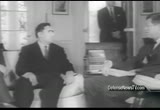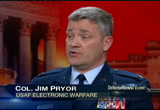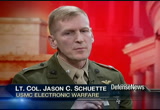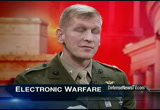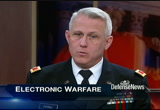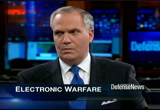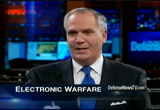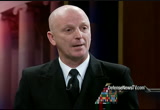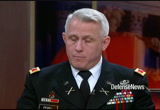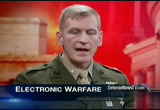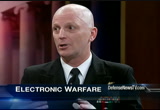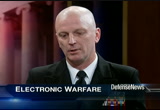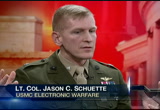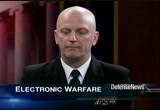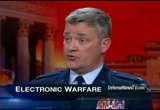tv This Week in Defense CBS February 3, 2013 8:00am-8:30am EST
8:00 am
welcome to "this week in defense news." i'm vago muradian. electronic warfare is the art and science of intercepting, interpreting, then controlling the electromagnetic spectrum including friendly and enemy communications. networks is one of the pentagon's top priorities. ew covers jamming, spoofing, and attacking enemy systems while defending your own network and was critical during the cold war. after the soviet collapse ew slipped to the sidelines, returning to the spotlight to did he he fend allied troops in iraq and afghanistan by jamming roadside bombs. ew has quietly become a priority as pentagon leaders
8:01 am
prepare for future conflict and russia, china, and other nation states improve their ew capabilities. u.s. forces depend on vast networks for intelligence, strikes, navigation and logistics, and leaders realize that any smart enemy will attack these systems in any conflict to handicap american forces. among the changes to bert protect forces has been to merge cyber and ew operations which are intimately intertwined. joining us are the four men who head the ew efforts for their respective services. colonel jim ekvall, chief of war far division. captain greg smith, director of the navy's threet electronic warfare, colonel jim "hook" pryor, chief of air force electronic warfare, and lieutenant colonel jason "dizzy" schuette, head of the warfare branch. guys, welcome. >> thank you. >> colonel he can value, let me start with you but i want to
8:02 am
kind of go around the table to get everybody's quick update on ew threats are that your services are facing and what you are doing them to prepare for the future. >> thanks, vag go. appreciate you taking time out to do. this our focus is the enemy's command and control on the battlefield. anything the enemy uses that uses the electromagnetic spectrum, i want to be able to attack it, go ago geeps his sensors, uav, whatever he has on the battlefield that uses the electromagnetic spectrum. we're developing our system that will attack or defend, depending, against all of those. >> that's right, because that's a big consolidation from the multitude of systems you have to be a much more streamlined system. each one of you guys have different challenges. captain smith, you are dealing with everything from surface ships to subs to everything else. why don't you give us an update. >> our chief has laid out three priorities. warfare first, operate forward and be ready. certainly having assured access
8:03 am
to the electromagnetic spectrum and freedom of maneuver in the electromagnetic spectrum is vital, whether we're talking about taking the fight to the enemy, particularly from tactical to strategic we have seen the adversary challenge our access and deny the command and control. certainly in operating forward we want to be able to do it in concert with al lays and partners and non disruptive to host nations. we have to be able to train at home and prepared to execute the way we are going to fight when we go forward. >> that's right, because the big difference has been over the last 10 years a much more benign environment from an ew perspective compared to where you are going to be. you are shaking your head so we can address in that a little bit, but colonel pryor. >> from the air force perspective we share a common view as most of the joint force does. thelectromagnetic spectrum is critical and you have to be able to maneuver in that spectrum just like on any battle field. so the pieces and parts that are important to us, one to attack the enemy's capability
8:04 am
and remove their ability, and then our ability, assure our ability to maneuver in that spectrum as well. we do that through a multitude of ways but we also look at it as has to be integrated with all of our weapon systems. a perfect example, you cannot look at a b-2 or an f-22 or f- 35 and understand that electronic warfare is foremost in the air force's priority. >> colonel. >> so i was watching the pictures as you were doing the introductions, and you had the ea-6-b. >> arotoma-quispe plane that both of you have a little experience in. >> yes, sir. for the marine corps, and i have 2,000 hours in it, i never flew in support of a marine air ground task force so i think that's going to be a little more parochial and agree with my counterparts here but for the marine corps because we haven't necessarily been able to bring that capability directly to the commander, that's where our focus needs to
8:05 am
be. for example, we have a radio battalion which is a great asset for us in terms of signal intelligence. it's now trying to bring that marriage of what do we need in the air to be able to support all those things in terms of electronic warfare but then marry that up with capabilities that we already have that are very well developed and bring a lot of capability to the joint forces. >> before i move on, i saw you shaking your head when i said -- and i was meaning this in a relative standpoint, but was the environment more challenging than people think in iraq and afghanistan from an ew perspective? >> well, since i was the one shake may head, i will say that what i think really challenged us was how the enemy was able to quickly adapt an use all those commercial technologies that are readily available. so you saw, at least in my opinion from a dod perspective, some scrambling, for lack of a better term, to try to counter that threat and get proactive and be ahead of the enemy. >> i want to get to the issue
8:06 am
of technology in a little bit, but, okay, let's talk about the technology for a second. what were some of the technologies that you think are key enablers for the future, and what do you think are some of the technologies that are most terrifying in the hands of an adversary? colonel? >> there are many things that are promising that the army has it not been using as an organic piece of our formation. as we develop this multifunction electronic warfare capability there are many things inside there which are promising. there are airborne electronic attack capabilities that the army has not had, so aim very excited by its inclusion in this greater integrated electronic warfare enterprise that we're working our way through now. i am most concerned, of course, about the enemy's ability to maneuver inside of anywhere in the electromagnetic spectrum which we can't defending a gains. so that's where my concern is.
8:07 am
>> colonel pryor. >> i agree. i think one of the things that the entire ew profession is concerned about, if i were to compare and contrast what we used to deal with, from just as simple as a ground threat in the high day of the cold war to modify a ground threat to operate somehow differently in electromagnetic spectrum required changes the boxes and an actual building of something different, where as today the modern threats that i think we will be facing in that spectrum are change the software code and maybe changed remotely. so the ability to synthesize what's going on in the spectrum, take that in, develop a plan to maneuver around it and then employ against it, that is one of the most difficult things i think we will face in future. >> i think we're commercial industry going with frequency sharing. most promising. we talk about maneuver warfare in terms of electromagnetic spectrum. to date with frequency
8:08 am
assignments and static frequency assignments more akin to trench warfare, but look at industry there's the promise of being able to be agile within the spectrum and being able to maneuver where the enemy is not and where we have freedom of action. the things that worry us and keep me up at nature is the imagination and the innovation of the adder of severe. it used to be it was the defense industry and the primary world powers that cornered the market on technology, but you the date's previous rent throughout in the commercial industry, off the shelf technology. >> some of the cryptographic stuff, or encrypted sums find are tremendous. and will require some heavy supercomm muting work to solve. more with our electronic warfare round table in just
8:09 am
it's been a long, tough year. a real test of what i'm made of. there were times i thought of giving in, but i did it. opened up that navy federal savings account and now we have this... ah. did it all online... it was easy. i don't hear any sweating. civilians... psh. 4 million members. 4 million stories. navy federal credit union.
8:10 am
we're back with our distinguished round table discussion on the future of military electronic warfare. colonel schuette, i want to go to your point about the technological opportunities and challenges. >> a really good opportunity, i think, because of what is going on in the commercial world talking about earlier, and i have my prop, my iphone, on the block diagram on a smartphone is virtually identical to what we have in what's flying out in theater today. >> electronic warfare pod. >> ea-60-like capability, and being able to leverage. so the technology from the commercial world is readily available. it's not a technology problem, it's a commercial problem. >> you held up a commercial
8:11 am
device. spectrum man agement is another piece of the puzzle. is the spectrum management plan that we've got something that's worrying you in terms of how we could constrict military bandwidth or military capability? >> it's a concern. whether it's a worry, it's got to be addressed pragmatically. great technology. the industry has shown an ability to share, but when you are talking about communication systems, that's a far simpler task than when you talk about radar and how do we share spectrum at that point. but we definitely know it is where we need to go and there's got to be, not only here at home, and i talked about being ready so we're prepared to defend at home, but there's a spectrum management plan that all of our international partners are putting in place that we've got to be able to adapt to when we deploy forward. >> let me go to the question of the tactical strategic balance. there are folks who are saying, for example, the marine corps and the army are too focused on
8:12 am
pushing capabilities down to small unit levels. and there's a concern by some that the services will trade away some of these strategic cape afternoon. what's the right balance between strategic and tactical? >> if you don't mind -- >> no, go ahead. >> our initial focus of the initial increment of our multifunction electronic war far system is the brigade commander. we want to provide him, the brigade commander with the capability to gain and maintain an advantage in the spectrum. but we don't think for a moment that he is the only commander on the battlefield who needs to have that same capability. so although our initial increment is focused on the bct -- >> the brigade combat team. >> the brigade combat team. we are not ignoring the requirements above that level. so while we continue to develop for the bct commander we're
8:13 am
also looking at larger and more robust platforms that will be for the division commander and the corps commander as well. >> i think it's important to note, and this is exactly what colonel ekvall was touching on, even though there are tactical effects on the battlefield there is an overarching architecture above it that feeds it, because even though, as it is dependent on advanced technologies, there are intelligence inputs that have to funnel into there to show where you the enemy is maneuvering. so that i think is the strategic part that still has to remain in place that signal intelligence, the electronic intelligence still has to occur. so there is a balance there. neither one exists without the other. >> you were going to say? >> i was going to add, from that strategic level as well, and here's this opportunity for services, i think what we found with the army and the marine corps able to work together, we
8:14 am
were able to plug in our army recruit system into the architecture and see them moving about the battlefield, interacting. yep, there's the tactical side of it. that communication. once that communication starts there's also the need to be able to withdraw from the. >> all of those tactical assets additional are sensors on the battlefield as well what. they see on the battlefield also has to come back into that strategic level. >> captain? >> you opened and talked about that addressing cyber and ew coming together, and particularly when you are thinking about cyber, literally the speed of light now, that speed of maneuver has blurred that line between, or certainly brought it closer together, strategic to tactical. whether you are talking about a 29soa for a surface ship, or we're talk about aircraft doing mock 2 plus, that kind of
8:15 am
maneuver. >> how does the introduction of sign and the merging of these two fields change things? >> it's interesting. i would say they aren't really merging, because that would imply they've never existed together, and they have. it's just now we need to view electronic warfare operating in the cyberspace domain exactly like we view it operating in the air domain, from my perspective, so the critical part is controlling the effects inside the cyberspace domain. we're operating at the -- >> another opportunity to give that feedback loop, am i having the effect i want to in the battle space. >> when you talk about electromagnetic spectrum, i really seat as the platform. in the navy we think about platform to maneuver space. we have ships, submarines undersea, aircraft. so sign i see is really the
8:16 am
platform that operates in that electromagnetic spectrum. is it the only one? no. is it the primary? i think so. >> up next, continuing our conversation with the electronic warfare chiefs from the army, navy, air it's been a long, tough year. a real test of what i'm made of. there were times i thought of giving in, but i did it. opened up that navy federal savings account and now we have this... ah. did it all online... it was easy. i don't hear any sweating. civilians... psh.
8:18 am
yes! announcer: there's a new team worth rooting for. watson: isn't that evidence? yeah, well, i will give it back when i am finished. there's nothing more hazardous to my health than boredom. what is wrong with you? you hacked my e-mail? took me seven tries to deduce a password. i noticed something in there. flexing our deductive muscles, are we? i could burst with pride. we're back with our round table of electronic warfare chiefs with army colonel jim
8:19 am
ekvall, navy captain greg smith, air force colonel jim "hook" pryor, and lieutenant colonel jason "dizzy" schuette. in every component there becomes an insatiable demand, and people can get enough of it. is the answer in the aus tear environment to start buying more or bringing into service things like a b-1 bomber that has a tremendous electronic capability? >> great question. certainly if you look at what "dizzy" and the marine corps are doing, or the ew community that i work with, we have very, very similar requirements for ew. because we have similar requirements, we really ought to be pursuing similar ways to fill those requirements. and so last year "dizzy"'s
8:20 am
guys, my guys all met together and we had a, where do we gain synergies? we've done a couple of joint exercises. we're going meat again next week. >> do you need a better coordinating element? you guys are colonel-grade officers. do you need a general officer that is tee w boss that helps coordinate among the services? >> i would argue that -- this is would you don't know went hurt you. no. as long as we're allowed to do our jobs, be ew experts, what i found is on the action officer level it is pretty easy for us to be able to take technologies and blend them together. and we've demonstrated that on more than one occasion. >> this is the only community that is that important that does not have a barron somewhere high up in the structure. >> that is very true. all of the services view ew as an enabling capability. >> the admiral said otherwise,
8:21 am
that it's a critical war fighting skill, and vice admiral rogers would say he has both. the effort is getting that balance. cyber, we've got, very consuming, but we were reaching that balance where cyber and ew can operate together. >> your community is growing. the army and the marine corps has a training challenge here because this is a very tough skill set, incident electric you the actually very challenging, as much art as it is science. what are you guys doing to train up the next generation going into this career field? >> right now what we've got going on is our uas community, flying shadow, a node that takes the ms data in the form of eo and ir right now. our thought process is to expand on that ew payload as well around utilize that community to kind of push/pull that around the battle space. >> colonelr we bandwidth limited? there is always a question about whether the pipe is big enough to handle everything that's going through it. >> as we were talking before,
8:22 am
bandwidth, our requirement for bandwidth is really an insay shafnlt we will use as much bandwidth as we can possibly get. do we need to limit that? infuture conflict i think we've all recognized that we won't have the connective tea or the bandwidth that we're used to, and so we certainly need to build exercises and training scenarios in which we do limit that bandwidth. >> this goes to my near, dear topic to my heart, mission control something, the u.s. military used to be very good at, not to radiate to give stuff away, but also to be able to function when systems are denied. last 20 years we've been operating as if we owned the skies because in part we do. sir, let me start with you and good around the table. what do we need to be doing to prepare ourselves for a future where these systems, the access to the information network we depend on will be denied? >> very important skill that the navy has let atrophy as someone who during the cold war
8:23 am
made efforts in the north atlantic, we did neglect it. not just the mission and thinking about radio emissions, but our entire sing, the ability to be tracked, surveilled, we have to manage all of those signatures. >> sir? >> from a marine core perspective, a small twist what i have learned from my radio battalion brethren, it's critical to listen. what we need to do, electronic attack is one way that mux up the environment so listening more, more es, more collection is probably where we need to focus. >> colonel pryor. >> the good news we have identified yes we know we're not good at it like we used to be so we've done multiple efforts to try and fix that. so i would identify the air sea battle office which is looking at what are some things we can do to buy back that capability we had before, and air combat command re7b8 completed the effective war fighting in a contested environment study to look at those problems.
8:24 am
>> sir, the last 25 seconds. >> one is train in a coms- denied environment more than we do. the second thing, we can't look at it in a vacuum. this is about what does a spectrum manager do, what does a cyber operations guy do and what does an electronic warfare specialist do. all of those guys to have work together. >> and a lot better up-front planning across the board, greater development of authority and control. guys, thanks very much. we alright everybody, get your heads up. now when i was in the military, i learned that if you stand together, you can stand up to anything! no matter where i was deployed, i always knew that somebody had my back! you boys are your own band of brothers! you have each other! just like i had navy federal credit union... 24/7... live customer support! let's go! let's go!
8:25 am
4 million members. 4 million stories. navy federal credit union. this is dylan right here, this is dylan, and this is his big brother hayden. dylan's only five, but he's already been through two surgeries for brain tumors. and he just went through his second round of chemo. and this is their mother, dawn, who runs this loving and happy home. she too struggled with tumors. but that doesn't slow her down. her love of family comes first. their dad, phil, works two jobs, repairing copiers, and on weekends delivering newspapers. but the bills keep piling up, and the heating bill gets pushed off. when you learn about their difficulties, it just breaks your heart. when we asked the biggest oil companies to help families in need, only citgo, the people of venezuela, and president hugo chavez responded. thanks to them, citizens energy is able to deliver millions of gallons of fuel to families just like the berios. i'm joe kennedy. if you need help staying warm, call me at 1-877-joe-4-oil.
8:26 am
because no one should be left out in the cold! few military fields are a higher priority or faster moving than electronic warfare which senior pentagon leaders see as the key to defending networks core to america's war fighting capability. while ew loss policemen nancy after the cold war he returned to the limelight defending troops in iraq and afghanistan. advances by russia and china have spurred an ew renaissance that culminated with efforts to merge ew and cyber given the close relationship between the two when with good reason the u.s. military depends on massive net with for operations and logistics. as in our personal lives the ability to communicate 24/7 has made people dependent on electronic capabilities. the challenge is how best to protect these net with and continue operations if they're ever jammed or destroyed by
8:27 am
enemies. our panel discussion made known the importance of these but also highlighted there isn't one senior person in charge. it's time to designated a senior advocate in the pentagon to everysee critical ew and cyber capabilities to ensure the services plans are synchronized in this era of fiscal austerity. thanks for joining us for this. this i'm vago muradian. watch on-line at defensenewstv.com or e-mail me at vag two at defensenewstv.com. i'll be back next week at the same time.
8:29 am
right now, 150 ways to cut medicare costs. will any of them work? i'm steve usdin. welcome to "biocentury this week"." your trusted source for biotechnology, information and analysis, "biocentury this week." congress has postponed the debt ceiling crisis. now the focus in washington has swung back to budgets and deficits. the nation is heading toward budget sequestration. for medicare this means a 2% spending cut. but that's just a downpayment. any serious attempt to tackle the deficit must curb the increase in medicare and medicaid spending. last week a kaiser family foundation report listed 150 ideas to reduce medicare spending. the problem is almost all of
120 Views
IN COLLECTIONS
WUSA (CBS) Television Archive
Television Archive  Television Archive News Search Service
Television Archive News Search Service 
Uploaded by TV Archive on

 Live Music Archive
Live Music Archive Librivox Free Audio
Librivox Free Audio Metropolitan Museum
Metropolitan Museum Cleveland Museum of Art
Cleveland Museum of Art Internet Arcade
Internet Arcade Console Living Room
Console Living Room Books to Borrow
Books to Borrow Open Library
Open Library TV News
TV News Understanding 9/11
Understanding 9/11
